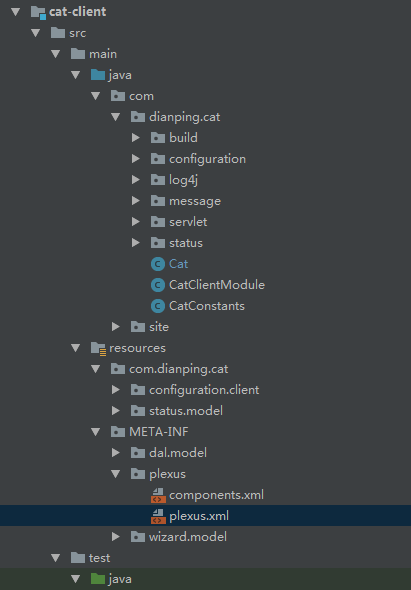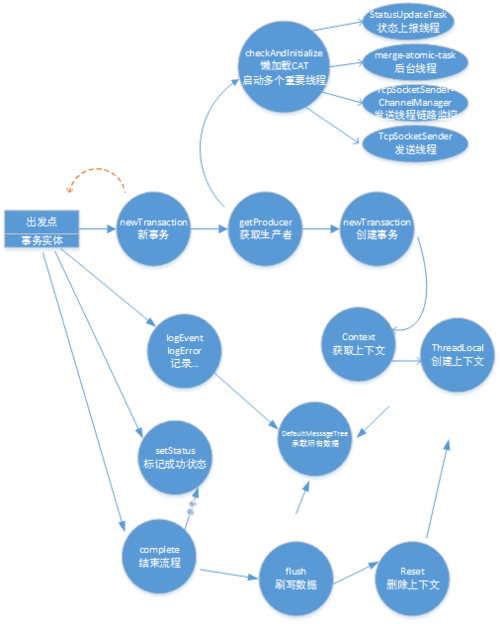CAT 由大众点评开发的,基于 Java 的实时应用监控平台,包括实时应用监控,业务监控。对于及时发现线上问题非常有用。(不知道大家有没有在用)
应用自然是最初级的,用完之后,还想了解下其背后的原理,所以有了源码阅读一说。
今天来看看 cat-client 模块,重在调用方。
打开文件,首先看一下使用说明,背景,资料。ok,进入正题。
先大致看一下目录结构:
接下来,从样例开始着手,在这里从单元测试开始干活。
public class CatTest {
@Test public void test() {
Transaction trans = Cat.newTransaction("logTransaction", "logTransaction");
Cat.newEvent("logEvent", "logEvent");
Cat.newTrace("logTrace", "logTrace");
Cat.newHeartbeat("logHeartbeat", "logHeartbeat");
Throwable cause = new Throwable();
Cat.logError(cause);
Cat.logError("message", cause);
Cat.logTrace("logTrace", "<trace>");
Cat.logTrace("logTrace", "<trace>", Trace.SUCCESS, "data");
Cat.logMetric("logMetric", "test", "test");
Cat.logMetricForCount("logMetricForCount");
Cat.logMetricForCount("logMetricForCount", 4);
Cat.logMetricForDuration("logMetricForDuration", 100);
Cat.logMetricForSum("logMetricForSum", 100);
Cat.logMetricForSum("logMetricForSum", 100, 100);
Cat.logEvent("RemoteLink", "Call", Message.SUCCESS, "Cat-0a010680-384736-2061");
Cat.logEvent("EventType", "EventName");
Cat.logHeartbeat("logHeartbeat", "logHeartbeat", Message.SUCCESS, null);
trans.setStatus(Transaction.SUCCESS);// trans.setStatus(cause); trans.complete();
Assert.assertEquals(true, Cat.isInitialized());
}
}看得出来,cat把其主要功能都列举在了这个单元测试里。大概功能就是,记录event,trace,error,metrics.
不过,咱们只讨论下其中个别类型的处理就O了。
先来看第一个创建事务的方法:
Cat.newTransaction("logTransaction", "logTransaction");// 进入方法查看,1. 先获取生产者; 2. 创建一个事务
public static Transaction newTransaction(String type, String name) { return Cat.getProducer().newTransaction(type, name);
}// 查看获取生产者的方法,检查是否已初始化,如果没有初始化则进行初始化,深度咱们就先到这里
public static MessageProducer getProducer() {
checkAndInitialize(); return s_instance.m_producer;
}// 2. 创建一个事务,1.先获取上下文如果没有则新建; 2. 如果可以记录消息,则立马创建一个默认事务DefaultTransaction; 3. 开启执行,返回事务实例,供下文调用; @Override public Transaction newTransaction(String type, String name) { // this enable CAT client logging cat message without explicit setup
if (!m_manager.hasContext()) {
m_manager.setup();
} if (m_manager.isMessageEnabled()) {
DefaultTransaction transaction = new DefaultTransaction(type, name, m_manager);
m_manager.start(transaction, false); return transaction;
} else { return NullMessage.TRANSACTION;
}
}// 2.1. 如何获取当前上下文, @Override public void setup() {
Context ctx; if (m_domain != null) {
ctx = new Context(m_domain.getId(), m_hostName, m_domain.getIp());
} else {
ctx = new Context("Unknown", m_hostName, "");
}
m_context.set(ctx);
}// 2.2. 检查是否已初始化上下文 @Override public boolean hasContext() { return m_context.get() != null;
}// 2.3. 上下文怎么保证线程安全,使用 ThreadLocal 线程变量
private ThreadLocal<Context> m_context = new ThreadLocal<Context>();
// 2.4. 开启一个事务,1. 获取上下文; 2. 开启上下文事务; 3. 如果是tag类型的事务,则将其放入 m_taggedTransactions; 配置有误,只提示一次警告 @Override public void start(Transaction transaction, boolean forked) {
Context ctx = getContext(); if (ctx != null) {
ctx.start(transaction, forked); if (transaction instanceof TaggedTransaction) {
TaggedTransaction tt = (TaggedTransaction) transaction;
m_taggedTransactions.put(tt.getTag(), tt);
}
} else if (m_firstMessage) {
m_firstMessage = false;
m_logger.warn("CAT client is not enabled because it's not initialized yet");
}
}// 2.4.1. 获取上下文
private Context getContext() { if (Cat.isInitialized()) {
Context ctx = m_context.get(); if (ctx != null) { return ctx;
} else { if (m_domain != null) {
ctx = new Context(m_domain.getId(), m_hostName, m_domain.getIp());
} else {
ctx = new Context("Unknown", m_hostName, "");
}
m_context.set(ctx); return ctx;
}
} return null;
}// 2.4.2. 开启事务,1. 如果stack为空就把事务设置到m_tree上,否则处理子节点; 2. 把事务压入栈中;
public void start(Transaction transaction, boolean forked) { if (!m_stack.isEmpty()) { // Do NOT make strong reference from parent transaction to forked transaction. // Instead, we create a "soft" reference to forked transaction later, via linkAsRunAway() // By doing so, there is no need for synchronization between parent and child threads. // Both threads can complete() anytime despite the other thread.
if (!(transaction instanceof ForkedTransaction)) {
Transaction parent = m_stack.peek();
addTransactionChild(transaction, parent);
}
} else {
m_tree.setMessage(transaction);
} if (!forked) {
m_stack.push(transaction);
}
}// 2.4.3. 上下文结构
public Context(String domain, String hostName, String ipAddress) {
m_tree = new DefaultMessageTree(); // 创建一个消息树
m_stack = new Stack<Transaction>(); // 存放栈信息
Thread thread = Thread.currentThread();
String groupName = thread.getThreadGroup().getName();
m_tree.setThreadGroupName(groupName);
m_tree.setThreadId(String.valueOf(thread.getId()));
m_tree.setThreadName(thread.getName());
m_tree.setDomain(domain);
m_tree.setHostName(hostName);
m_tree.setIpAddress(ipAddress);
m_length = 1;
m_knownExceptions = new HashSet<Throwable>();
}
// DefaultModuleInitializer
@Override public void execute(ModuleContext ctx, Module... modules) {
Set<Module> all = new LinkedHashSet<Module>();
info(ctx, "Initializing top level modules:"); for (Module module : modules) {
info(ctx, " " + module.getClass().getName());
} try {
expandAll(ctx, modules, all); for (Module module : all) { if (!module.isInitialized()) {
executeModule(ctx, module, m_index++);
}
}
} catch (Exception e) { throw new RuntimeException("Error when initializing modules! Exception: " + e, e);
}
}// 调用executeModule方法,初始化数据
private synchronized void executeModule(ModuleContext ctx, Module module, int index) throws Exception { long start = System.currentTimeMillis(); // set flat to avoid re-entrance
module.setInitialized(true);
info(ctx, index + " ------ " + module.getClass().getName()); // execute itself after its dependencies module.initialize(ctx); long end = System.currentTimeMillis();
info(ctx, index + " ------ " + module.getClass().getName() + " DONE in " + (end - start) + " ms.");
}
// cat初始化
// this should be called during application initialization time
public static void initialize(File configFile) {
PlexusContainer container = ContainerLoader.getDefaultContainer();
initialize(container, configFile);
} public static void initialize(PlexusContainer container, File configFile) {
ModuleContext ctx = new DefaultModuleContext(container); // 该方法会去 components.xml中查找 org.unidal.initialization.Module 的实现类,
Module module = ctx.lookup(Module.class, CatClientModule.ID); if (!module.isInitialized()) {
ModuleInitializer initializer = ctx.lookup(ModuleInitializer.class);
ctx.setAttribute("cat-client-config-file", configFile);
initializer.execute(ctx, module);
}
}// components.xml 中配置的 Module, 加载入 CatClientModule
<component> <role>org.unidal.initialization.Module</role> <role-hint>cat-client</role-hint> <implementation>com.dianping.cat.CatClientModule</implementation> </component>
// plexus.xml 中 配置日志输出
<plexus>
<components>
<component>
<role>org.codehaus.plexus.logging.LoggerManager</role>
<implementation>org.unidal.lookup.logger.TimedConsoleLoggerManager</implementation>
<configuration>
<dateFormat>MM-dd HH:mm:ss.SSS</dateFormat>
<showClass>true</showClass>
<logFilePattern>cat_{0,date,yyyyMMdd}.log</logFilePattern>
<baseDirRef>CAT_HOME</baseDirRef>
<defaultBaseDir>/data/applogs/cat</defaultBaseDir>
</configuration>
</component>
</components></plexus>// logEvent 举个例子,event处理过程
Cat.logEvent("RemoteLink", "Call", Message.SUCCESS, "Cat-0a010680-384736-2061");// 进入方法
public static void logEvent(String type, String name, String status, String nameValuePairs) {
Cat.getProducer().logEvent(type, name, status, nameValuePairs);
} // DefaultMessageProducer, logEvent @Override public void logEvent(String type, String name, String status, String nameValuePairs) {
Event event = newEvent(type, name); if (nameValuePairs != null && nameValuePairs.length() > 0) {
event.addData(nameValuePairs);
}
event.setStatus(status);
event.complete();
} // DefaultEvent, complete 方法 @Override public void complete() {
setCompleted(true); if (m_manager != null) {
m_manager.add(this);
}
} // DefaultMessageManager, add方法,添加到上下文中 @Override public void add(Message message) {
Context ctx = getContext(); if (ctx != null) {
ctx.add(message);
}
} // DefaultMessageManager, 最终添加方法
public void add(Message message) { if (m_stack.isEmpty()) {
MessageTree tree = m_tree.copy();
tree.setMessage(message);
flush(tree);
} else {
Transaction parent = m_stack.peek();
addTransactionChild(message, parent);
}
}
// DefaultMessageManager, 发送刷写数据
public void flush(MessageTree tree) { if (tree.getMessageId() == null) {
tree.setMessageId(nextMessageId());
}
MessageSender sender = m_transportManager.getSender(); if (sender != null && isMessageEnabled()) {
sender.send(tree);
reset();
} else {
m_throttleTimes++; if (m_throttleTimes % 10000 == 0 || m_throttleTimes == 1) {
m_logger.info("Cat Message is throttled! Times:" + m_throttleTimes);
}
}
}
// TcpSocketSender, 发送数据 // 先插入 BlockingQueue<MessageTree> m_queue 阻塞队列中,如果插入失败,则进行日志队列检查 @Override public void send(MessageTree tree) { if (isAtomicMessage(tree)) { boolean result = m_atomicTrees.offer(tree, m_manager.getSample()); if (!result) {
logQueueFullInfo(tree);
}
} else { boolean result = m_queue.offer(tree, m_manager.getSample()); if (!result) {
logQueueFullInfo(tree);
}
}
} // 日志队列检查
private void logQueueFullInfo(MessageTree tree) { if (m_statistics != null) {
m_statistics.onOverflowed(tree);
} int count = m_errors.incrementAndGet(); if (count % 1000 == 0 || count == 1) {
m_logger.error("Message queue is full in tcp socket sender! Count: " + count);
}
tree = null;
} // 如果队列不为空,则插入到上一节点之后
private void addTransactionChild(Message message, Transaction transaction) { long treePeriod = trimToHour(m_tree.getMessage().getTimestamp()); long messagePeriod = trimToHour(message.getTimestamp() - 10 * 1000L); // 10 seconds extra time allowed
if (treePeriod < messagePeriod || m_length >= m_configManager.getMaxMessageLength()) {
m_validator.truncateAndFlush(this, message.getTimestamp());
}
transaction.addChild(message);
m_length++;
} // DefaultTransaction, addChild, 添加子节点,完成添加操作 @Override public DefaultTransaction addChild(Message message) { if (m_children == null) {
m_children = new ArrayList<Message>();
} if (message != null) {
m_children.add(message);
} else {
Cat.logError(new Exception("null child message"));
} return this;
}// Transaction 的 complete 实现,最终的提交
trans.complete();// 进入方法,如果已经结束,则认为是异常情况 @Override public void complete() { try { if (isCompleted()) { // complete() was called more than once
DefaultEvent event = new DefaultEvent("cat", "BadInstrument");
event.setStatus("TransactionAlreadyCompleted");
event.complete();
addChild(event);
} else {
m_durationInMicro = (System.nanoTime() - m_durationStart) / 1000L;
setCompleted(true); // 防止下次再进入
if (m_manager != null) {
m_manager.end(this);
}
}
} catch (Exception e) { // ignore }
} // DefaultMessageManager, end 方法 @Override public void end(Transaction transaction) {
Context ctx = getContext(); if (ctx != null && transaction.isStandalone()) { if (ctx.end(this, transaction)) {
m_context.remove();
}
}
} // DefaultMessageManager, end transaction 进行校验
public boolean end(DefaultMessageManager manager, Transaction transaction) { if (!m_stack.isEmpty()) {
Transaction current = m_stack.pop(); if (transaction == current) {
m_validator.validate(m_stack.isEmpty() ? null : m_stack.peek(), current);
} else { while (transaction != current && !m_stack.empty()) {
m_validator.validate(m_stack.peek(), current);
current = m_stack.pop();
}
} if (m_stack.isEmpty()) {
MessageTree tree = m_tree.copy();
m_tree.setMessageId(null);
m_tree.setMessage(null); if (m_totalDurationInMicros > 0) {
adjustForTruncatedTransaction((Transaction) tree.getMessage());
}
manager.flush(tree); return true;
}
} return false;
} // 验证事务的正确性,对嵌套的 transaction 进行验证
public void validate(Transaction parent, Transaction transaction) { if (transaction.isStandalone()) {
List<Message> children = transaction.getChildren(); int len = children.size(); for (int i = 0; i < len; i++) {
Message message = children.get(i); if (message instanceof Transaction) {
validate(transaction, (Transaction) message);
}
} if (!transaction.isCompleted() && transaction instanceof DefaultTransaction) { // missing transaction end, log a BadInstrument event so that // developer can fix the code markAsNotCompleted((DefaultTransaction) transaction);
}
} else if (!transaction.isCompleted()) { if (transaction instanceof DefaultForkedTransaction) { // link it as run away message since the forked transaction is not completed yet linkAsRunAway((DefaultForkedTransaction) transaction);
} else if (transaction instanceof DefaultTaggedTransaction) { // link it as run away message since the forked transaction is not completed yet markAsRunAway(parent, (DefaultTaggedTransaction) transaction);
}
}
} // 适应事务时间段
private void adjustForTruncatedTransaction(Transaction root) {
DefaultEvent next = new DefaultEvent("TruncatedTransaction", "TotalDuration"); long actualDurationInMicros = m_totalDurationInMicros + root.getDurationInMicros();
next.addData(String.valueOf(actualDurationInMicros));
next.setStatus(Message.SUCCESS);
root.addChild(next);
m_totalDurationInMicros = 0;
}// 发送最后的数据
public void flush(MessageTree tree) { if (tree.getMessageId() == null) {
tree.setMessageId(nextMessageId());
}
MessageSender sender = m_transportManager.getSender(); if (sender != null && isMessageEnabled()) {
sender.send(tree);
reset();
} else {
m_throttleTimes++; if (m_throttleTimes % 10000 == 0 || m_throttleTimes == 1) {
m_logger.info("Cat Message is throttled! Times:" + m_throttleTimes);
}
}
} // 可以记录的前提是,所有条件均满足 @Override public boolean isMessageEnabled() { return m_domain != null && m_domain.isEnabled() && m_context.get() != null && m_configManager.isCatEnabled();
}// 发送messageTree到 LinkedBlockingQueue<MessageTree> m_tree @Override public void send(MessageTree tree) { if (isAtomicMessage(tree)) { boolean result = m_atomicTrees.offer(tree, m_manager.getSample()); if (!result) {
logQueueFullInfo(tree);
}
} else { boolean result = m_queue.offer(tree, m_manager.getSample()); if (!result) {
logQueueFullInfo(tree);
}
}
}// 发送数据完成后,需要将原来的数据清空还原,以便下次可用 @Override public void reset() { // destroy current thread local data
Context ctx = m_context.get(); if (ctx != null) { if (ctx.m_totalDurationInMicros == 0) {
ctx.m_stack.clear();
ctx.m_knownExceptions.clear();
m_context.remove();
} else {
ctx.m_knownExceptions.clear();
}
}
} // 上下文的移除,其他链表结构各自移除
public void remove() {
ThreadLocalMap m = getMap(Thread.currentThread()); if (m != null)
m.remove(this);
} // 为保证上下文绝对移除,再次操作 @Override public void end(Transaction transaction) {
Context ctx = getContext(); if (ctx != null && transaction.isStandalone()) { if (ctx.end(this, transaction)) {
m_context.remove();
}
}
}// 写入队列后,由 TcpSocketSender 线程进行轮询发送到cat后台
@Override public void run() {
m_active = true; while (m_active) {
ChannelFuture channel = m_manager.channel(); if (channel != null && checkWritable(channel)) { try {
MessageTree tree = m_queue.poll(); if (tree != null) {
sendInternal(tree);
tree.setMessage(null);
}
} catch (Throwable t) {
m_logger.error("Error when sending message over TCP socket!", t);
}
} else { long current = System.currentTimeMillis(); long oldTimestamp = current - HOUR; while (true) { try {
MessageTree tree = m_queue.peek(); if (tree != null && tree.getMessage().getTimestamp() < oldTimestamp) {
MessageTree discradTree = m_queue.poll(); if (discradTree != null) {
m_statistics.onOverflowed(discradTree);
}
} else { break;
}
} catch (Exception e) {
m_logger.error(e.getMessage(), e); break;
}
}
try {
Thread.sleep(5);
} catch (Exception e) { // ignore it
m_active = false;
}
}
}
}
如此,整个cat埋点的过程就搞定了。关键技术就是:
1. ThreadLocal 用于保存上下文埋点,保证线程安全。
2. LinkedBlockingQueue 用于保存消息树,作为生产线程与消费线的沟通桥梁!
3. AtomicInteger 用于计数,保证准确性。
4. 心跳线和用于发送本机的状态到cat后台。
5. 懒加载,单例模式的使用。
等等,来个图:
原文出处:https://www.cnblogs.com/yougewe/p/9479638.html
共同学习,写下你的评论
评论加载中...
作者其他优质文章







